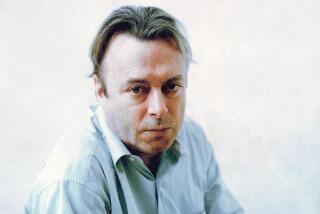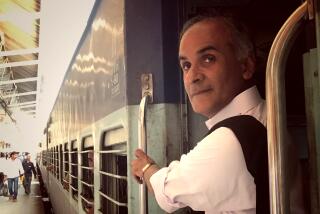Christopher Hitchens, world traveler
- Share via
The BBC’s obituary of author and essayist Christopher Hitchens who died Thursday notes that he once resolved to visit “a country less fortunate than [his] own” at least once a year. That took him to places such as Poland, Argentina and Greece in the 1970s and more recently Uganda, Romania, Nicaragua and Iraq. It’s an interesting quest.
Hitchens, of course, wrote prolifically about these places with provocative fervor, usually in the form of essays or commentaries on politics, political leaders, etc. As book critic David L. Ulin writes in this L.A. Times appreciation: “That was the thing about Hitchens — agree with him or not, it was impossible not to be stirred by his willingness to stake out unpopular positions, to say things that others weren’t willing to say.”
His works also contain deftly written portraits of what he saw on his travels, little gems that have always made me a bit of a Hitchens fan.
Here’s an excerpt from a 2008 Vanity Fair story about Britain’s exclusive Eton school in which he gives his homeland a stony stare:
“One summer morning I took myself off to have a look round the old place. It’s not hard to find, on the outskirts of London and just in the shadow of the Queen’s largest and ugliest palace, Windsor Castle. ... Walking along High Street, which joins the college to the castle, one passes a succession of discreet tailors, ancient timbered inns and tea shops, a Victorian-era mailbox, a photographer with a display of young Rupert Everett and Hugh Grant look-alikes in his window, before coming to a stretch of the Thames where Sir Christopher Wren had his house and where there is the largest flock of white swans I have ever seen. Big drooping willows and painted barges and boathouses complete the scene: I am always amazed at how much of old Britain still survives. Only the gruesome flight path of Heathrow Airport, planes grinding through the sky overhead, provides a reminder of the encroachments of modernity.”
And this on India, from a Slate essay, also from 2008:
” ... [O}n my first visit to India, in 1980, I stayed at the Taj Mahal in Bombay, visited the “Gateway of India” and took a boat to Elephanta Island, toured the magnificent railway station, had my first diwali festival at Juhu beach, and paced the amazing corniche that was still known by some—after its dazzling string of lights—as “Queen Victoria’s necklace.” Wonderful though some of the 19th-century British architecture can be, Bombay is quintessentially an Indian achievement, and an achievement of all its peoples from the Portuguese-speaking Catholic Goans to the Zoroastrian Parsis.”
There’s much more, of course, to be gleaned from his works for those who don’t mind their travel writing spiked with plenty of outrage and opinion.
More to Read
Sign up for The Wild
We’ll help you find the best places to hike, bike and run, as well as the perfect silent spots for meditation and yoga.
You may occasionally receive promotional content from the Los Angeles Times.







